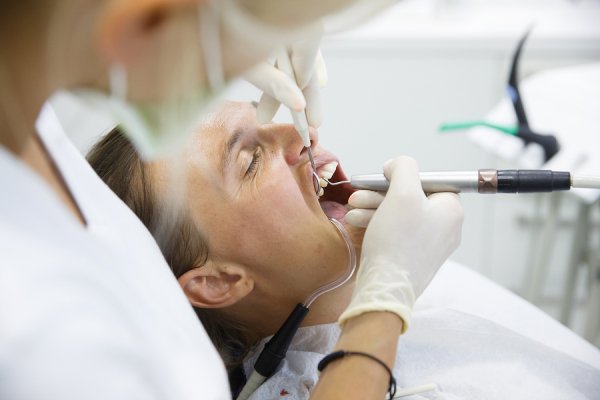
You know it’s important to keep your smile bright and your mouth cavity-free, but do you give much thought to your gums? You should! Many people who have gum disease don’t even realize it, yet when it’s left untreated, gum disease can be detrimental to the health of your whole body.
- How much do you know about gum disease? Gum disease begins when plaque builds up along and under the gum line. Plaque is filled with bacteria, and it’s sticky, so it clings to teeth and gums. When it’s not removed, it can cause infections that lead to gum disease and tooth decay.
- The first stage of gum disease is called gingivitis. It can cause your gums to become inflamed, red, and tender, as well as swollen and prone to bleeding. Fortunately, at this stage, you still have time to reverse the damage before it impacts the bone and tissue holding the teeth in place.
- Periodontitis is a more advanced type of gum disease. This is much more serious because it affects the bones holding your teeth in place. When it’s not treated, it can ruin not just your gums, but also the bones and tissues connected to your teeth. Advanced periodontitis can damage your bite and lead to the necessity of tooth removal.
- Do you know the signs of gum disease? In the early stages, you might not even have symptoms. However, after a while, you might notice consistently bad breath, separating or loose teeth, gums that bleed easily or are swollen, red or tender, or gums that have pulled away from your teeth.
- Gum disease has an impact on the health of other systems in your body. There’s evidence to support a link between gum disease and conditions like heart disease and diabetes.
This all may seem frightening, but in truth, it’s not hard to protect the health of your gums.
- Don’t smoke. Smoking is terrible for your whole body and is strongly associated with gum disease. It weakens your immune system, making it harder to fight off gum infections and harder for your gums to heal from damage.
- Brush, floss, and rinse. The order in which you do this does not matter, as long as you’re brushing at least twice a day with fluoride toothpaste, flossing at least once a day, and rinsing with a therapeutic mouthwash. When you brush, make sure you brush your tongue as well as your teeth
- Get regular dental cleanings. This gets rid of tartar, as well as plaque left behind, but it also allows your dentist to catch gum disease early, before it causes any major problems.
If you’re looking for dentistry services in Chicago, you can trust the team at University Associates in Dentistry. We offer complete dental care, from regular cleanings and routine treatment to complex specialty care. Schedule a dentist appointment in Chicago by calling (312) 704-5511, or visit our website for more information or a complimentary consultation.


 Millions of Americans have gum disease. If you suffer from red, tender, or bleeding gums, you may have this condition as well. Gum disease affects many people, and without appropriate treatment, the ramifications of it can be permanent. By knowing just how rampant, serious, yet preventable gum disease is, you can make more informed choices about avoiding and addressing it. If you suspect you have this problem, see a
Millions of Americans have gum disease. If you suffer from red, tender, or bleeding gums, you may have this condition as well. Gum disease affects many people, and without appropriate treatment, the ramifications of it can be permanent. By knowing just how rampant, serious, yet preventable gum disease is, you can make more informed choices about avoiding and addressing it. If you suspect you have this problem, see a 




